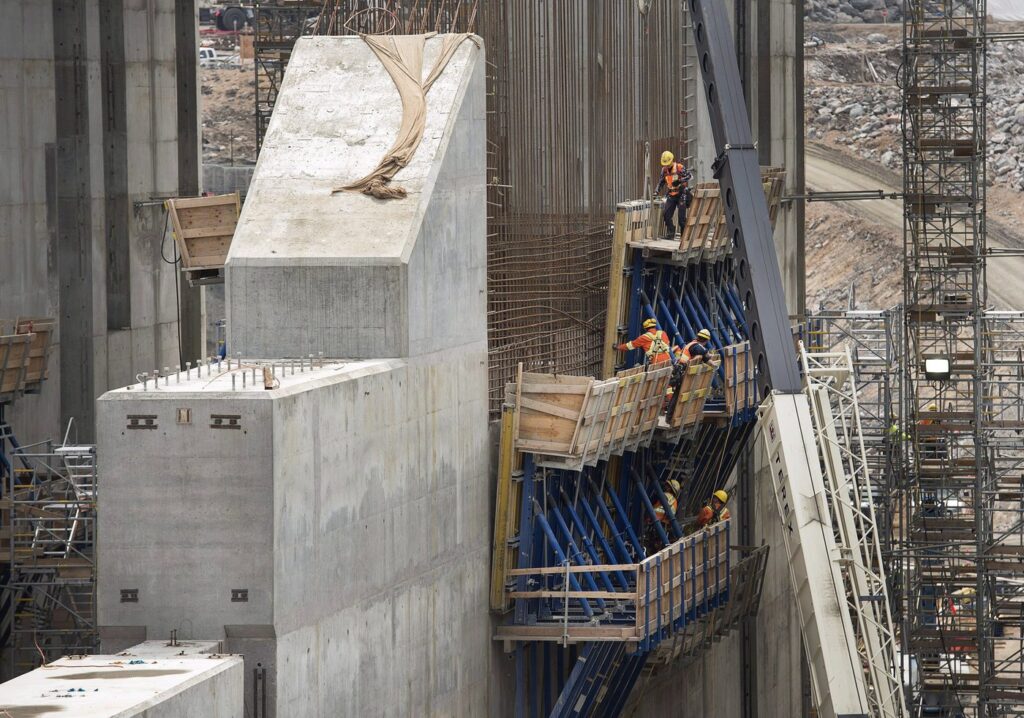
The construction site of the hydroelectric facility at Muskrat Falls, Newfoundland and Labrador is seen on Tuesday, July 14, 2015. As Newfoundland and Labrador Premier Andrew Furey prepares for energy talks with Quebec Premier Francois Legault, a panel recommends the two strike a new Churchill Falls energy deal. THE CANADIAN PRESS/Andrew VaughanPRESS/Andrew Vaughan
![]()
ST. JOHNS – As Newfoundland and Labrador Premier Andrew Furey prepares for energy talks this week with Quebec Premier François Legault, an expert panel is recommending the two strike a new Churchill Falls hydroelectric energy deal.
The existing agreement between the two provinces expires in 2041, and a panel assembled last year by the Newfoundland and Labrador government says the province should negotiate a new arrangement with Hydro-Québec.
Legault has made the deal’s renewal a key piece of his energy strategy as the province tries to lower greenhouse gas emissions and meet its growing electricity needs.
He is expected to travel to Newfoundland on Thursday for two days of talks with Furey.
The 1969 Churchill Falls deal allows Hydro-Québec to purchase 85 per cent of the electricity generated at the station in central Labrador — and therefore reap most of the profits. The remaining 15 per cent is used to serve customers on the Labrador system or is sold to export markets.
As of 2019, the deal has yielded close to $28 billion in profits to Quebec, compared to just $2 billion for Newfoundland and Labrador.
The panel issued a statement late Tuesday saying it is committed to protecting the interests of all Newfoundlanders and Labradorians, but it also said it would not be releasing its full report to protect the province’s commercial interests and ability to negotiate.
“Revealing the details of this analysis could compromise the province’s ability to achieve maximum value for the energy, capacity and storage of Churchill Falls,” the panel said. “It is time to get this right, and the work of this panel has started us down that road.”
Aside from a new deal with Quebec, the panel is recommending Newfoundland and Labrador increase sales of electricity both inside and outside the province.
The panel is also recommending that the province ensure Indigenous people in Labrador are properly consulted about the future of the Churchill River.
“As a tremendous source of renewable, low-carbon energy, Churchill Falls electricity offers significant potential towards the achievement of national, regional, and provincial climate change and net-zero emissions goals,” the panel said.
The Churchill Falls facility has a generating capacity of 5,400 megawatts. It produces about 34 billion kilowatt-hours annually.
The generating station and transmission equipment in Labrador is owned and operated by the Churchill Falls (Labrador) Corp. Newfoundland and Labrador Hydro, a Crown corporation owned by the government of Newfoundland and Labrador, owns 65.8 per cent of the corporation’s shares, and Hydro-Québec owns the rest.
While the existing contract expires in 2041, Hydro-Québec will keep its 34.2 per cent share of the corporation.
“Taking lessons from the past, it’s time to look to the future and make decisions that ensure the people of (Newfoundland and Labrador) get the maximum value of this unique and important asset,” the panel said. “There is more planning, consultation, decision-making, and negotiation to come.”
This report by The Canadian Press was first published Feb. 22, 2023.
Editor’s note: Churchill Falls Hydroelectric Generating Facility, with 5,428 megawatts capacity, has more power generating capacity than the entire province of Saskatchewan, combined, if every single coal and gas turbine, every wind turbine are running at 100%, and every solar panel is entirely lit at noon. If Newfoundland actually got a fair deal from its power sales over 50 years ago, it would not have been a have-not province for the last five decades. However, numerous court cases, up to the Supreme Court of Canada, have locked Newfoundland into the deal until 2041, selling power to Hydro Quebec for $2 per megawatt-hour. In New York (which buys power from Hydro Quebec), “Higher fuel costs have led to higher average wholesale electricity prices as well. In February 2022, the average year-to-date wholesale electricity cost was $118.36/Megawatt-hour (MWh), according to NYISO data.”
- 0110 SaskEnergy SEI_Network_Members_Burn_Brighter0110 SaskEnergy SEI_Network_Members_Burn_Brighter
- 0109 SaskPower SASPO_2817_PLT_Recruitment_DIVERSITY0109 SaskPower SASPO_2817_PLT_Recruitment_DIVERSITY
- 0106 SASPO-2874_Self Serve Campaign_New Connects_Youtube_v30106 SASPO-2874_Self Serve Campaign_New Connects_Youtube_v3
- 0105 SaskEnergy Commitment to Safety0105 SaskEnergy Commitment to Safety
- 0102 Lori Carr Coal Extended0102 Lori Carr Coal Extended
- 0100 Turnbull Project Manager0100 Turnbull Project Manager
- 0099 Mryglod Steel 1080p0099 Mryglod Steel 1080p
- 0097 Eagle Sky Ventures LTD0097 Eagle Sky Ventures LTD
- 0095 Fast Trucking nearly 70 years good at it0095 Fast Trucking nearly 70 years good at it
- 0092 Turnbull projects big and small0092 Turnbull projects big and small
- 0046 City of Estevan This is Estevan Teaser0046 City of Estevan This is Estevan Teaser
- 0077 Caprice Resources Stand Up For Free Speech0077 Caprice Resources Stand Up For Free Speech
- 0061 SIMSA 2024 For Sask Buy Sask0061 SIMSA 2024 For Sask Buy Sask
- 0051 JML Hiring Pumpjack assembly0051 JML Hiring Pumpjack assembly
- 0049 Scotsburn Dental soft guitar0049 Scotsburn Dental soft guitar
- 0041 DEEP Since 2018 now we are going to build0041 DEEP Since 2018 now we are going to build
- 0032 IWS Summer hiring rock trailer music
- 0022 Grimes winter hiring
- 0021 OSY Rentals S8 Promo
- 0018 IWS Hiring Royal Summer
- 0013 Panther Drilling PO ad 03 top drive rigs
- 0002 gilliss casing services0002 gilliss casing services
- 9002 Pipeline Online 30 sec EBEX9002 Pipeline Online 30 sec EBEX
- 9001
